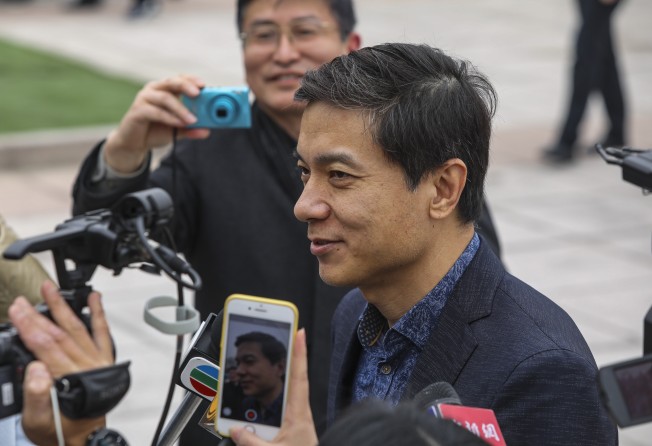Baidu chief shrugs off renewed competition in search in China, saying the technology requirements are huge
- Baidu has 20 years of experience in search, which has high barriers to entry and requires expertise in artificial intelligence, says Li

Baidu chairman and chief executive Robin Li Yanhong has played down the impact from new competition in search, as a slowing economy pushes consolidation and crossover business among China’s internet giants.
“There will always be competition as companies expand and ecosystems overlap,” said Li, when asked about new competition from domestic rivals on the sidelines of China’s annual top legislative and political gathering, known as the “two sessions”, on Wednesday. “We should mind our own business.”
However, the billionaire founder of China’s dominant search engine could not resist taking a dig at competitors. “Behind [search] there’s a huge amount of technology involved, which those with entertainment genes may not be cut out for.”
Li’s remarks come after Jinri Toutiao became the latest to join the search fray. The news aggregation app of Chinese tech giant Bytedance launched an external search function earlier this month, enabling users to access content outside the app for the first time.
“A search service has been made available. It is part of Toutiao's expanded services in line with our motto of information creates value. Users can access it via the search bar on Jinri Toutiao. The product is still in a testing phase,” said a Bytedance spokeswoman in response to a request for comment.
Baidu has 20 years of experience in search, which has high barriers to entry and requires expertise in artificial intelligence, according to Li. “Baidu has been investing in AI for over 10 years,” said Li “search itself is a product of AI”.
Li’s remarks come at a challenging time for the traditional search business, which is facing a slowdown in advertising amid a slowing Chinese economy. Baidu continues to dominate the traditional gateway to the internet in the country, and its position was further entrenched when Google pulled out of China in 2010 over Beijing’s strict censorship rules.
Despite China being walled off from Western online services such as Facebook and Google, Li praised the openness of the Chinese internet market, adding that almost all major internet companies in China are funded to some extent by US capital.
“The openness of China’s [internet] market brings a lot of opportunities. US capital is likely making the most money in China’s internet industry and when it comes to the US internet industry - it’s still US capital,” he said.
In today’s mobile era, Tencent and Bytedance are progressively winning more eyeballs and their apps soak up about 45 per cent and 13 per cent of user time in China respectively, according to data from Aurora Mobile. In all, Chinese netizens spent an average of 4.2 hours on mobile apps per day in the fourth quarter of 2018.
Analysts are concerned that as the PC era and search fades, while AI is still in the early stages of development, Baidu will find it difficult to maintain past growth.
However, in its fourth-quarter results posted last month, Baidu said its app achieved daily active users of 161 million in December 2018, a 24 per cent increase year on year. Meanwhile, its short video platform Haokan, a major battlefield with Bytedance’s Tik Tok, saw DAUs grow from 1 million to 19 million over the same period.
Baidu remains the country’s dominant search engine, with a market share of about 75 per cent, followed by Alibaba's Shenma and Sogou, according to February statistics from Statcounter.